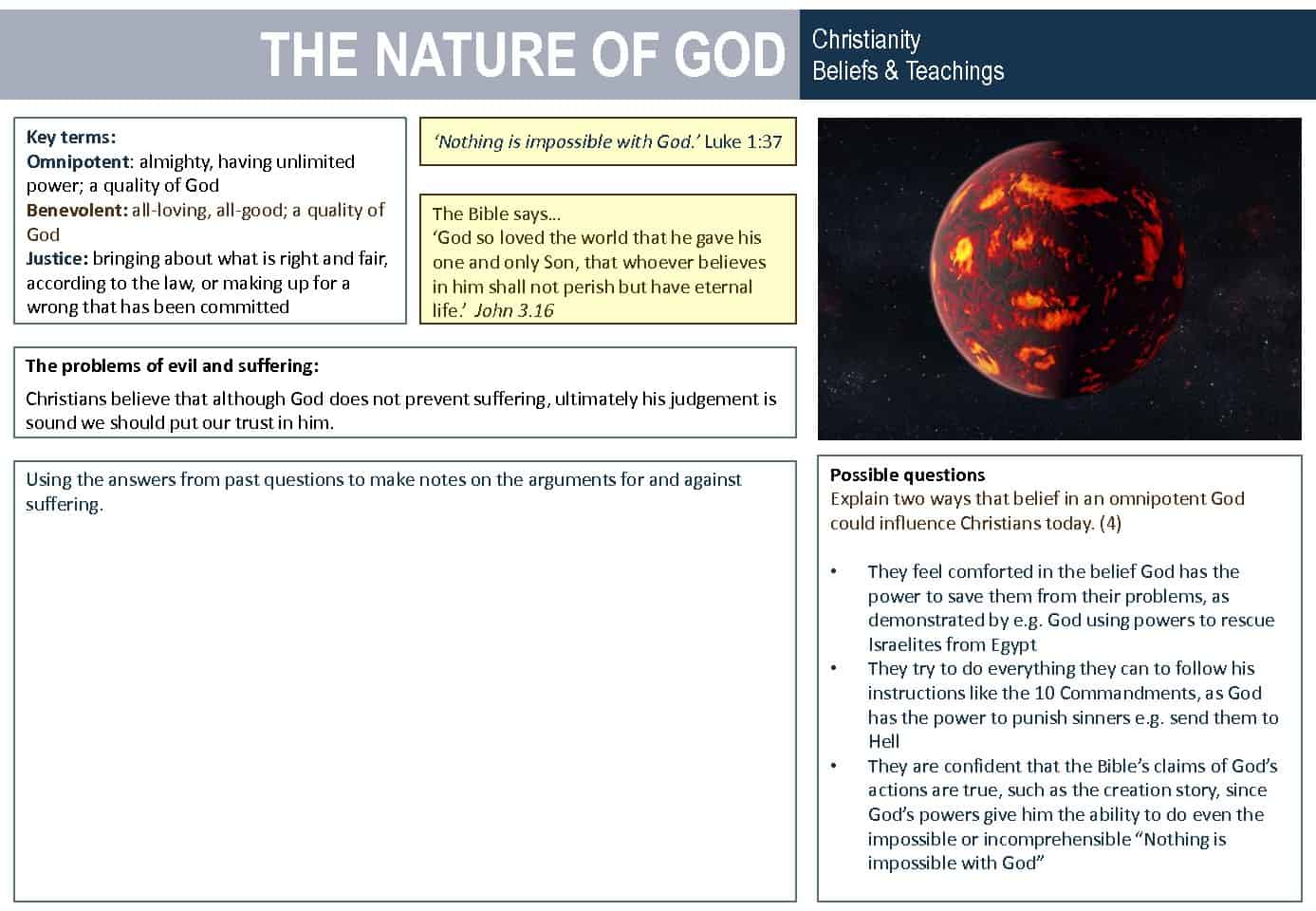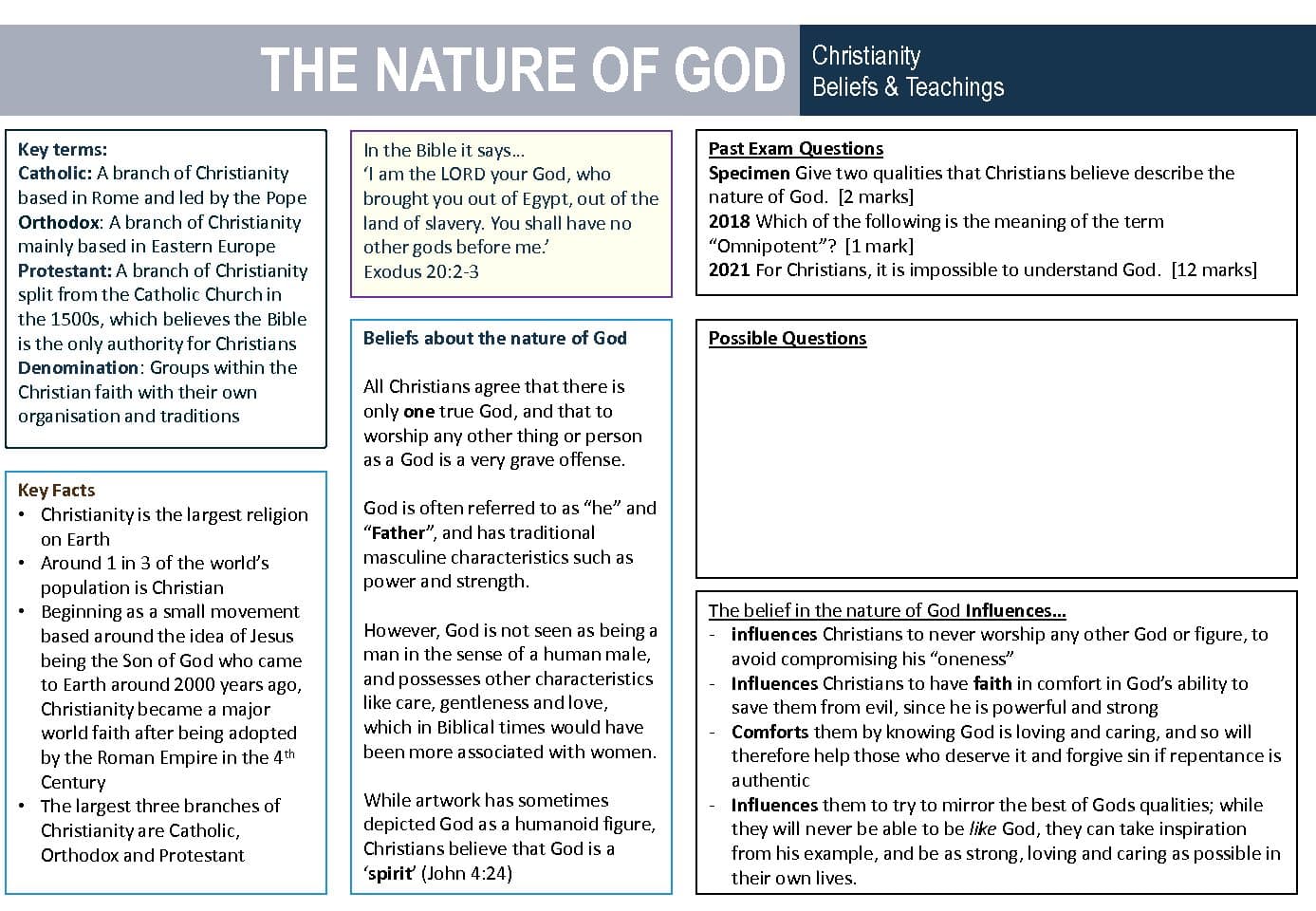Christian beliefs & teachings
The nature of God
- God as omnipotent, loving and just
- The problem of evil and suffering
The nature of God
Give two qualities that Christians believe describe the nature of God (2)
- Omnipotent
- loving
- just
- One
- Trinity
- merciful
- forgiving
- omniscient
- eternal
Explain two ways in which the belief that God is just influences Christians today. (4)
• it influences them to try and be fair towards others/this is because
they believe God loves them and is fair to them too. They have
experienced the justice of God so they want others to experience it,
etc
• it influences them to try to bring about justice in the world. This is
because God cares about justice. They will try to end injustice, etc
• they believe that God is pleased with people who are just and fair
like him. So they will try to develop this quality. God sets them an
example to follow, etc.
For Christians, it is impossible to understand God. (12)
Arguments in support
• This is true because Christians do not agree about God’s nature / so by definition it cannot be understood.• God is beyond human understanding in every respect / this includes understanding God’s nature.
• God is believed to exist as a Trinity – as Father, Son and Holy Spirit / Christians describe this as a ‘mystery’, but it is hard to understand how one being can exist in three distinct forms.
• The Nicene Creed describes God as ‘the Father Almighty / the one Lord Jesus Christ, the only begotten Son of God / the Holy Ghost, the Lord and Giver of life’, but many Christians struggle to understand these ideas and how they combine into one God.
• As God the Son, Jesus is believed to have been God in human form / but Jesus’ body was crucified by the Romans / some Christians therefore have difficulty in understanding the resurrection narratives.
• God is seen as loving / but the amount of evil and suffering in the world makes it difficult for Christians to understand this.
• God is seen as omnipotent / all-powerful, eg Matthew 19:26, ‘With God, all things are possible.’ / but if God is all-powerful and all-loving, some Christians cannot understand the nature of a God who allows evil to exist.
• God is also seen as a just judge, eg John 5:30, where Jesus says, ‘My judgement is just because I seek not my own will but the will of him who sent me.’ / but some Christians then do not understand why God sends people to hell (Matthew 25:41: ‘Depart from me, you cursed, into the eternal fire prepared for the devil and his angels’), etc.
Arguments in support of other views
• Others might argue that the universe exists / so the nature of whoever or whatever made it can be understood by looking at its complexity, design and beauty.
• Some might use the cosmological argument to suggest that the universe shows a creator’s design and power in creating the universe out of nothing.
• Some will argue that the oneness of God and the Trinity of Father, Son and Holy Spirit can be understood, but in a limited way / because God has to be incomprehensible in order to be God.
• The nature of the Trinity is a spiritual truth, and not one of logic or science / it is not the meaningless joining up of three gods but the idea of three persons within the one nature of God / Christians can relate to the persons of Father, Son and Spirit.
• The question of why an all-powerful and all-loving God allows evil to exist can be answered simply / without evil, there is no challenge – nothing to overcome – no reason to try to improve / Jesus spent his life showing his followers how to improve.
• God’s nature as a just judge can be understood in a similar way / when Jesus warns his followers about hell (eg Matthew 25:31-46) he may be speaking figuratively – hell is people’s missed opportunities to do what is right.
• Some might argue that it does not matter if a created being cannot understand the creator / an ant could hardly be expected to understand physics / equally a human cannot be expected to understand God, etc.
‘A loving God would not send anyone to hell.’ (12)
Arguments in support
– The Bible insists that God is loving. eg John 15:9: ‘God so loved the world that he gave his only begotten son so that those who believe in him should not perish but have everlasting life. This kind of love would not include hell.
– God is a fair judge. A fair judge would not sentence anybody to pain and torment / so God would not send anybody to hell.
– Eternal punishment would be pointless and unloving. So God would not do anything that is pointless.
– Some Christians are universalist and argue that everyone will eventually respond to God’s love. Repenting and being forgiven for the sins they may have committed, etc.
Arguments in support of other views
– The Bible refers to hell as a real place. A place of fire and torment / In the Parable of the Sheep and the Goats, it says that those who do not look after others will depart into eternal punishment / God’s love therefore includes hell.
– Some will understand hell as separation from God, or as a person’s state of mind, where they punish themselves for their own misdeeds. This idea of hell does not mean that God is unloving.
– Some will argue that hell is an invention used by Christians (and others) / it is a threat of punishment in order to make sure that people follow Christian teachings. Alternatively, there is no God to send anybody to hell in the first place.
– God gives free will so the choice is for people to make. God has to accept the choice of some to reject him, etc.
‘If God were loving, there would be no suffering in the world.’ (12)
Arguments in support
– letting people suffer is cruel; humans who allow others to suffer are
denounced for it. No acceptable reason can be given for the suffering of so many innocent people, particularly children.
– if there is a purpose to suffering, it could be achieved in some other way that does not result in such misery. So much suffering as part of the evolutionary process suggests a creator that does not care.
– even if God is not the cause of suffering, he should be able to stop
it; since he doesn’t, he must not be loving.
Arguments in support of other views
– if God constantly intervened to prevent suffering, it would remove
one of his greatest gifts to humans, free will
– suffering enables spiritual growth and deepens trust in God. The existence of suffering inspires people to reflect the love and compassion of God in their response to those who are suffering
– some Christians believe that God is all-loving but not omnipotent, and so although he would wish to remove suffering, he cannot
– humans are limited and so cannot understand God’s purposes for his world; as the book of Job states, they are called to trust
‘God cannot be loving because people suffer.’ (12)
Arguments in support
• Christians believe that God is all-loving. A loving God would want to stop all suffering, and has the power to stop suffering, so suffering should not exist.
• If God is loving God would know that humans are weak, and would end suffering.
• This applies to life after death as well – an all-loving and just God would not allow people to suffer after they die, but the Bible teaches that hell is real. eg in the Parable of the Sheep and the Goats.
• Most natural disasters are not caused by anything done by humans and animals / so God should take control of disasters such as earthquakes, volcanic eruptions and floods, etc.
• God created humans, so why would a loving God create people to suffer?
• It is not just that God allows suffering , the extent of suffering is huge, eg those who are victims of crimes such as rape, murder, arson, theft. Why would a loving God allow so much suffering? etc.
Arguments in support of other views
• Humans are responsible for what they do to others. So a lot of suffering is caused by ourselves, and not by God (references to Genesis – humanity being expelled from Eden for disobeying God).
• Having free will means that humanity must have the power and the choice to reject the moral rules in the Bible and cause other people to suffer.
• Despite being all-powerful, God himself suffered on the cross, so if God can suffer, so can we. Perhaps God is all-loving but is not all-powerful.
• By suffering on the cross for human salvation, Jesus atoned for human sins in order to
release/redeem humanity from suffering and sin: eg John 3:16: ‘God so loved the world that he gave his only Son so that those who believe in him should not perish …’
• One answer to suffering is prayer / as in the Parable of the Unjust Judge (Luke 18:1–8).
• Love does not exclude suffering / parents discipline their children through love, to make them better people / doctors can inflict pain on their patients to cure their illnesses.
• A world without suffering would be a toy world / we have to learn through suffering, etc.
• Some see suffering as a test of faith, following which God will reward them with eternal life.
• Suffering is needed as a balance, to appreciate the good / without bad, good cannot be recognised / suffering teaches us to look after the world.
• Our response to suffering is important, eg Jesus from the cross: ‘Forgive them, for they know not what they do.’ (Luke 23:34), etc.
Possible question
Explain two ways that belief in an omnipotent God could influence Christians today. (4)
- They feel comforted in the belief God has the power to save them from their problems, as demonstrated by e.g. God using powers to rescue Israelites from Egypt
- They try to do everything they can to follow his instructions like the 10 Commandments, as God has the power to punish sinners e.g. send them to Hell
- They are confident that the Bible’s claims of God’s actions are true, such as the creation story, since God’s powers give him the ability to do even the impossible or incomprehensible “Nothing is impossible with God”
Resources
Videos

The nature of God

Job & suffering

Suffering




